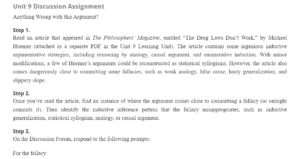Fallacies and Inference
Fallacies and Inference in ‘Drug Laws Do Not Work’ by Michael Huemer
Fallacies are misleading information used to convince audiences of a specific argument. People use fallacies in conversations where the facts do not support the argument. Fallacies such as the appeal to fear or appeal to emotion can be used to sway an audience’s belief from one belief to another. In the article ‘Drug laws do not work’ by Michael Huemer, a couple of fallacies bring the point across, such as weak analogy, false cause, and inductive inference.
The first fallacy is a weak analogy. A weak analogy fallacy occurs when a person links the comparison between different subjects of different magnitudes together that do not support the argument. In the article, Huemer argues that a man named Flip destroys his computer and doesn’t get any form of punishment by the law because it belongs to him. Additionally, he makes another argument on the effects of attacking other people with the same laptop. He makes another argument on the limitations and disadvantages of drug laws against illegal substances compared to legal substances such as alcohol. His comparison between these arguments makes the argument weak because the subjects being compared to each other lack common ground.
The second fallacy is the false cause. False cause fallacy occurs when the conclusion of an argument is made accidentally based on the result of a connection that doesn’t exist. Huemer tries to make a casual connection between the arguments in the article. The comparison between computers and drugs is not a casual connection, and the use of this connection to conclude signifies the false cause fallacy.
Inductive inference is evident in the article. Inductive inference occurs when an argument is based on evidence. Inductive inference forms the premises of a valid deductive argument and logically entails the conclusion for weak arguments. The inductive logic of hypothesis evaluation is used in this article, Bayesian Inference.
Premise: The legalization of drugs will reduce corruption, crime, free up state resources, and restore respect (h_i\cdot b\cdot c \vDash e\)
Conclusion: The proportion of the reduction of crimes, corruption, free up of state resources, and restore respect depends on the legalization of drugs.
Drugs should not be legalized because their legalization will promote poverty. The theory promoted in the article is based on a combination of one person’s ideas.
ORDER A PLAGIARISM-FREE PAPER HERE
We’ll write everything from scratch
Question
Unit 9 Discussion Assignment
Anything Wrong with this Argument?

Fallacies and Inference
Step 1.
Read an article that appeared in The Philosophers’ Magazine, entitled “The Drug Laws Don’t Work,” by Michael Huemer (attached as a separate PDF in the Unit 9 Learning Unit). The article contains some ingenious inductive argumentative strategies, including reasoning by analogy, causal argument, and enumerative induction. With minor modifications, a few of Huemer’s arguments could be reconstructed as statistical syllogisms. However, the article also comes dangerously close to committing some fallacies, such as weak analogy, false cause, hasty generalization, and slippery slope.
Step 2.
Once you’ve read the article, find an instance of where the argument comes close to committing a fallacy (or outright commits it). Then identify the inductive inference pattern that the fallacy misappropriates, such as inductive generalization, statistical syllogism, analogy, or causal argument.
Step 3.
On the Discussion Forum, respond to the following prompts:
For the fallacy:
- Name the fallacy that you were able to identify
- Define the fallacy – based on the lectures and reading
- Explain why you think it’s
For the inductive inference pattern:
- Identify the type of inductive inference that the argument misuses
- Reconstruct its premise(s) and conclusion
Regarding your personal opinion:
- Do you think that drugs should be legalized, or perhaps that only certain drugs should be legalized? What are your reasons?
Step 4.
Read and respond to two other students’ posts with substantial replies that follow these commenting points:
- Do you think their reconstruction of the fallacy is well done? Does their explanation make sense? If not, what additional comments can you offer to clarify it?
- Do you agree with the reasons they offer regarding drug legalization? Which of their reasons do you agree/disagree with and why?
- Search the internet for a recent commentary (news article published within the last 3 years) about drug laws, legalization, punishments etc – and offer this article as a gift to your fellow student. Link to the article, then explain why you chose this article and how it relates to their position (it might be supporting their view or contradicting it).
- NOTE: you can “gift” the same article to other students, as long as you specifically connect the article to their position on drug

